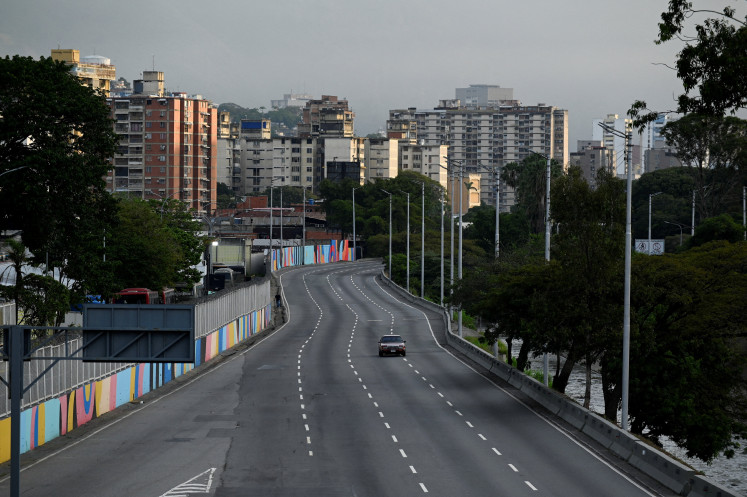Popular Reads
Top Results
Can't find what you're looking for?
View all search resultsPopular Reads
Top Results
Can't find what you're looking for?
View all search resultsAnalysis: Financial deepening a must for high economic growth
Indonesia has the potential to become the seventh largest economy in the world by 2030 with an average economic growth of 5
Change text size
Gift Premium Articles
to Anyone
I
ndonesia has the potential to become the seventh largest economy in the world by 2030 with an average economic growth of 5.3 percent and a gross domestic product (GDP) of US$4 trillion (the country's current GDP is around $900 billion).
For the next five years, the government has set a very ambitious economic growth target of 7 percent annually with GDP per capita in 2019 at Rp 72 million ($5,450), an increase of more than one half of the GDP per capita in 2014.
This high growth target brings consequences for the high funding need for development. The government's medium-term development plan (RPJM 2015'2019) predicts that to achieve this target, around Rp 22.5 quadrillion in funding is needed with the contribution from the government around 15 percent.
About 25 percent (Rp 5.5 quadrillion) is needed, for infrastructure development, which includes road, rail, land, air and sea transportation; urban development; power; energy; information technology; water resources; sanitation and housing.
For infrastructure funding, the government expects that the private sector will contribute around 31 percent while the rest will be provided by central and local governments as well as state-owned enterprises.
To achieve this ambitious target and to become the seventh largest economy in 2030, there is a need to significantly deepen the financial sector in Indonesia. The capital market needs to grow around six to eight fold to achieve a $4-6 trillion market value in 2030, which implies that the capital market must grow around 13 to 16 percent annually for the next 16 years. If the government fails to seriously deepen the financial sector, the potential loss is around $600 billion.
Compared to other countries in the same group, the financial sector in Indonesia is very shallow. Several indicators to measure financial deepening such as the ratio of capital market to GDP, the ratio of outstanding government bonds to GDP, interbank loans to GDP and daily transaction volumes in the US dollar for exports and imports for Indonesia are low. In addition, a ratio of M2 (money supply) to GDP in 2014 for Indonesia was only 41 percent, far below Malaysia (143 percent), Singapore (133 percent), Thailand (134 percent) and the Philippines (70 percent).
Funding needed from the private sector comes from banking, the capital market, the bonds market, internal private sources (own capital, retained earnings and depreciation) and foreign capital. Other than internal private sources, until now banking has contributed the largest portion of investment funding.
However, banking's capacity for funding is now limited because the loan to deposit ratio (LDR) has reached 90 percent, although the ratio of loan to GDP is still 40 percent. Therefore, other funding sources need to be developed to fulfil the 7 percent growth target.
Other funding sources are portfolio investment and foreign direct investment. Capital inflow in the first two months of 2015 is relatively high compared to the same period last year. However, since the second week of March, the inflows have slowed and even now are already outflowing. In addition, the foreign ownership of outstanding government bonds is relatively high and has reached 40 percent. This condition makes the financial sector in Indonesia vulnerable from sudden capital outflows.
There are six components that build an ecosystem for financial deepening: capital users (those who need capital), capital providers (those who own capital), financial intermediaries, financial instruments, market infrastructure and regulatory, legal and macroeconomic conditions. Comparing Indonesia's condition in these six components with other countries such as Malaysia, Thailand, India, the Philippines, Chile and South Africa, one can conclude that Indonesia is lagging in almost all components.
It mainly lags on issues in the capital market, weak domestic investors because of a lack of support from strong financial intermediaries, limitations in a variety of instruments, and policies that do not provide a sufficient incentive for financial sector development. These issues indicate that Indonesia's financial sector is still shallow and needs fundamental improvements.
Capital and bonds markets in Indonesia need to be developed. Indonesia does not have liquidity in some products like other countries do, like for foreign exchange options, asset-backed securities, real estate investment trusts and exchange traded funds. These products offer additional options for investors as well as provide hedging while deepening financial markets in Indonesia.
The Financial Services Authority (OJK) is preparing the issuance of these products and it is expected that by the end of this year these products can be utilized by investors.
Besides adding the variety of instruments in financial markets, Indonesia has a lot of funding potential that comes from long term funding such as insurance, pension funds and sharia financing, such as haj funds, zakat (alms tax) and wakaf (endowment).
However, the management of these funds is not optimal because pension funds and insurance still focus on a short-term investment return, since their investment performance is evaluated annually. Therefore, performance criteria for pension funds and insurance companies should be changed to provide incentives to fund management to invest in long-term investment.
Moreover, currently employees who switch job can claim their pension, although they have not yet reached pension age. This creates uncertainty for fund management. Thus, the regulation should be changed to discourage employees from claiming their pension before reaching pension age. If pension funds and insurance have been managed properly, this fund can be used to finance long-term investment, such as infrastructure projects, and it eliminates the mismatch between short-term funding (from the banking sector) with long-term investment needs.
Taxation hinders the deepening of the financial market in Indonesia. As admitted by the finance minister, the tax system in Indonesia has been in effect for long time, therefore cannot catch up with the advancement of instruments in the financial market.
One example is the implementation of collective investment contract-asset-based securities, which is hindered by the double taxation applied to special purpose vehicle companies (those established for special purposes only). These companies are considered as new, although they are actually paper companies, since both assets and liabilities are assets given by the originator or party that releases its assets to be sold to investors.
The most important thing in deepening the financial market in Indonesia lies in the implementation. There are lots of initiatives announced by the government but without close monitoring, there will be implementation issues.
Therefore, a task force on financial deepening is needed to monitor the implementation of these initiatives. The task force should consist of regulators from the Finance Ministry, Bank Indonesia, the OJK, the Law and Human Rights Ministry and the State-Owned Enterprises Ministry. The task force should be headed by a senior official with high authority, for example by the vice president, so it can make decisions if there is deadlock.
The task force should be assisted by a working group, which is responsible for the implementation of each initiative, and an advisory council, which consists of financial sector experts with experience and expertise in the domestic and international financial sectors. The business sector and the financial industry should also be involved, so the decisions made are practical and accepted by all stakeholders.
_______________________
The writer is the head of the Mandiri Institute, an independent research think tank established by Bank Mandiri.










